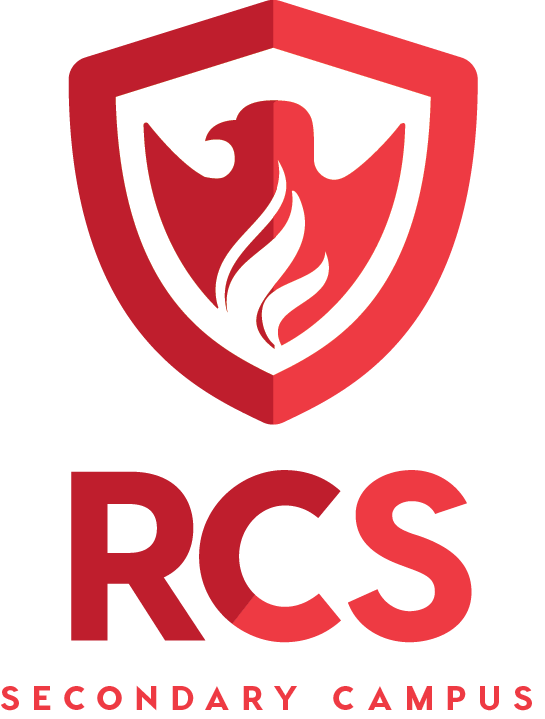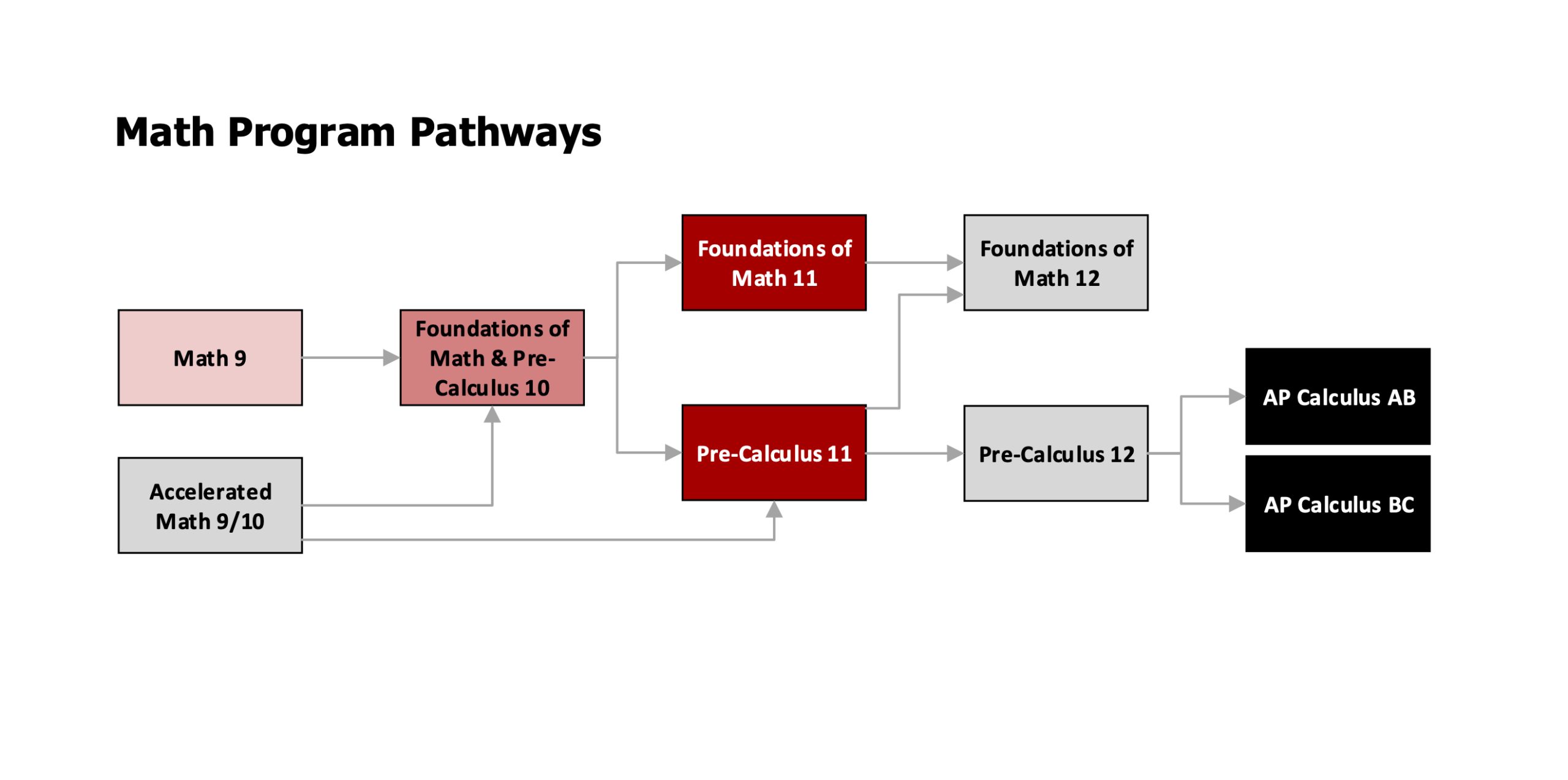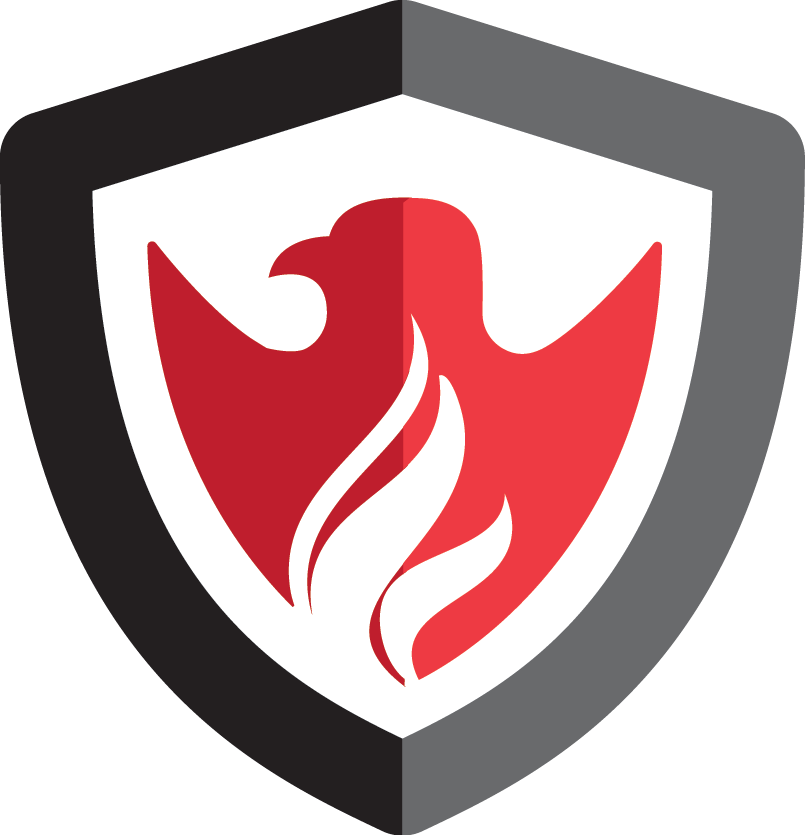
CURRICULUM & COURSE INFORMATION
ADST
MATH
ARTS
PHE
BIBLE
SCIENCE
CAREER
SOCIALS
ENGLISH
ESS
LANGUAGES
HOME
MATHEMATICS
The vision of the Mathematics department is to give opportunities for students to develop their mathematical skills, knowledge and competencies in the hope of developing reasoning skills that are interdisciplinary. We hope to provide a space that encourages risk-taking and views errors as opportunities for further learning, as well as a place to cultivate perseverance and tenacity. Our ultimate goal is that by doing so, students can continue to grow in the understanding and appreciation of God’s creation.
The BC Curriculum is designed for all students to have the same foundational Math program for Math 9. The Math 10 course, Foundations of Mathematics and Pre-Calculus Math 10, sets students up for either Grade 11 or Grade 12 Math Pathway.
The Pre-Calculus route is designed for students who are passionate about pursuing studies in the STEM field in post-secondary. The main objectives in each of Pre-Calculus 11 and Pre-Calculus 12 is to help students build on different strategies for solving and manipulating equations requiring variables and cartesian plane graphing. This course provides students with algorithmic based learning, and critical thinking skills based largely on expression manipulation. The content is largely theoretical with minimal immediate real-world applications, and is used to build a foundation for calculations in Physics, Chemistry, and Calculus.
The Foundational of Mathematics Pathway seeks to provide students with the mathematical understandings and critical-thinking skills identified for post-secondary studies in programs that do not require the study of theoretical calculus, mostly in the field of the arts, humanities, and social sciences. The main objectives in each of Foundations 11 and Foundations 12 is to help students build on different strategies for reading real world data from graphs, articles, and game-theory. This course provides students with exploratory learning through trial and error, and critical thinking skills on real-world scenarios.

Students in the Mathematics 9 Accelerated stream are on the pathway to taking Calculus AB or BC in grade 12. If a student not in the Accelerated stream wants to take one of the Calculus courses in their grade 12 year, they must take either Mathematics 10 or Pre-Calculus 11 during the summer. We highly recommend students take Mathematics 10 in the summer as both the density and difficulty of the course is less than Pre-Calculus 11 and students may have a more thorough learning experience of the grade 11 course during the school year.
Graduation Requirements Statement
To graduate, students need to take one Mathematics 10 course and one Mathematics course at the Grade 11 or 12 level
GENERAL
Mathematics 9
Prerequisite: Mathematics 8
This course provides many of the tools needed to understand God’s creation and is a foundational course for further studies in senior mathematics. Topics include rational numbers, powers and exponents, linear relations, linear equations, polynomials, spatial proportional reasoning, financial mathematics and data analysis. The main objective of the course is to have students be comfortable with performing the BEDMAS operations on fractions and decimals, as well as learning the basic algorithms of solving for variables. Students will also be encouraged to strengthen their mental math skills, particularly for numerical operations for digits between 1-15 for the basic operations (Adding, Subtracting, Multiplying, and Dividing).
In this course, students are encouraged to strengthen their mental math skills, and to be less reliant on calculators for the units on rational numbers. Students are also encouraged to develop their math proficiency so that they are able to complete timed tests within the time frames provided. At the end of this course students are prepared for Foundations and Pre-Calculus 10.
Mathematics 9/10 Accelareted
Prerequisite: Mathematics 8 (Mostly Extending Competencies) and Math 8 Teacher Endorsement
Graduation Requirement: Mathematics 10
Description: This course is designed to challenge students who have been gifted in the field of Mathematics. It combines Mathematics 9 and Foundations of Math and Pre-Calculus 10 curricula in one year. It provides students with the mathematical understandings and critical thinking skills identified for post-secondary studies for both the arts and sciences. At the end of this course, students are prepared for Pre-Calculus 11. Students should be able to perform basic BEDMAS operations with decimals and fractions. Mental math multiplication for numbers up to 20 is extremely helpful. Additionally, they should be comfortable with performing two-step equations with variables. As this course contains two full year courses in one school year, students must be prepared for additional practice outside of the classroom in the form of homework or review assignments.
Foundations of Mathematics and Pre-Calculus 10
Prerequisite: Mathematics 9
Graduation Requirement: Mathematics 10
Description: This course is designed to provide students with mathematical understandings and critical thinking skills identified for post-secondary studies in both the arts and the sciences. This course is based on the new BC Educational Plan. Topics include trigonometry, prime factorization, powers and exponents, arithmetic sequences, polynomials, relations and functions, linear equations and finance. Students are expected to be proficient in their usage of the scientific calculator, solving mathematical equations with variables. The main purpose of the course is to have students understand game-theory and probabilistic thinking on real-world situations. Students are recommended to be proficient in their mental math abilities for basic operations on numbers up to 15 to help them understand patterns. Additionally, students should be able to graph and solve basic multi-step linear equations.
This course will prepare students to go into Pre-Calculus 11 or Foundations of Mathematics 11.
FOUNDATIONS OF MATHEMATICS
Foundations of Mathematics 11
Prerequisite: Foundations of Math and Pre-Calculus 10
Graduation Requirement: Mathematics 11 or 12
Description: This pathway is designed for students who pursue the Humanities in the post-secondary programs. The completion of Foundations of Mathematics 11 and 12 is necessary for entrance to university. This course is designed to provide students with the mathematical understandings and critical-thinking skills identified for post-secondary studies in programs that do not require the study of theoretical calculus. Topics include financial mathematics, geometry, scale models, logical reasoning, graphical analysis, quadratic functions, systems of equations, optimization and applications of statistics. The main objectives of the course are having students understand how scale models and triangular formations impact our lives on a daily basis. Additionally, a thorough understanding of financial literacy is covered in depth in Foundations of Mathematics 12. Students should be proficient in using scientific calculators for basic BEDMAS operations. They should also be proficient in graphing points and lines on the cartesian plane.
Recommendations:
- Students should be proficient in adding, subtracting, dividing, and multiplying integers, fractions, and decimals, with a calculator.
- Students should be proficient in recognizing patterns represented by numbers, shapes, and graphs.
Foundations of Mathematics 12
Prerequisite: Foundations of Math 11 or Pre-Calculus 11
Graduation Requirement: Mathematics 11 or 12
Description: This pathway is designed for students who pursue the Arts and Humanities in the post-secondary programs. This course is designed to provide students with the mathematical understandings and critical-thinking skills identified for post-secondary studies in programs that do not require the study of theoretical calculus. Topics include financial planning, probability and chance, graphical analysis, logarithmic and trigonometric functions, and 3-dimensional geometry.
PRECALCULUS AND CALCULUS
Pre-Calculus 11
Prerequisite: Foundations of Math and Pre-Calculus 10
Recommendation for Success: minimum 70% and at least half of their Grade 10 Math competencies must be proficient or higher
Graduation Requirement: Mathematics 11 or 12
Description: This pathway is designed for students who pursue the Mathematics, Sciences and Business subjects in the post-secondary programs. This course is designed to provide students with the mathematical understandings and critical-thinking skills identified for entry into post-secondary programs that require the study of theoretical calculus. Topics include algebra and real number system, powers with rational exponents, quadratics, radical, polynomial, rational, linear and financial literacy, and trigonometry. Students should be able to perform basic operations without a calculator on numbers up to 20. Additionally, students are recommended to be highly proficient in using mathematical algorithms to solve equations. Students must have a good understanding of the basic Trigonometric functions. The main goal of this course is to have students solidify their understanding of factoring, completing the square, and solving and graphing trigonometric equations.
Recommendations:
- Students should be highly proficient in polynomial operations, including adding, subtracting, multiplying, dividing, and factoring.
- Students should be proficient in graphing two variable equations.
- Students should be highly proficient in translating word problems into mathematical language.
- Students should be highly proficient in using trigonometric functions to solve questions relating to triangles.
Pre-Calculus 12
Prerequisite: Pre-Calculus 11
Recommendation for Success: minimum 70% and at least half of their Pre-Calculus 11 competencies must be proficient or higher
Graduation Requirement: Mathematics 11 or 12
Description: This pathway is designed for students who pursue the Mathematics, Sciences and Business subjects in the post-secondary programs. This course is designed to provide students with the mathematical understandings and critical-thinking skills identified for entry into post-secondary programs that require the study of theoretical calculus. Topics include transformation of relations and functions (polynomial, exponential, rational and logarithms), trigonometry and geometric sequences and series. Students should have an extensive understanding of factoring, completing the square, and solving trigonometric equations. Students should be highly proficient in their usage of algorithmic methods when solving for complex equations. The main objective of the course is to have students translate graphs involving polynomial, radical, rational, logarithmic, and trigonometric equations.
Recommendations:
- Students should have an extensive understanding of algebraic operations and factoring.
- Students should be highly proficient in creative and critical thinking skills, as well as analytical skills for applying the new concepts.
- Students should have flexible and strategic approaches to solve problems.
AP® Calculus AB
Prerequisite: Pre-Calculus 12 (at least 86%) at RCS, Grade 12 Standing and Endorsement from Pre-Calc 12 teacher
Graduation Requirement: Elective
Description: Calculus is the mathematical study of dynamic (changing) phenomena, and it is fundamentally different from any other mathematics course. It attempts to achieve through indirect methods what appears impossible directly. It is no less than a celebration of human ingenuity, which if perceived correctly, gives glory to God who magnanimously created us in His image. This course allows students to delve into the more complex aspects of God’s creation and the number of applications of calculus is almost limitless. An advanced Placement course in calculus consists of a full high school academic year of work that is comparable to calculus courses in colleges and universities. The main objective of the course is to cover instantaneous rates of change for real world applications, as well as infinite summations to calculate areas. Students must be comfortable in solving all functions and graphing questions at the Pre-Calculus 12 level without a calculator. The homework load of Calculus AB is quite extensive and students must be prepared for additional homework outside of the classroom.
Recommendations:
- Students should have an extensive foundation in reasoning with algebraic symbols and working with algebraic structures.
- Students should have an extensive foundation in algebra, geometry, trigonometry, analytic geometry and elementary functions such as linear, polynomial, rational, exponential, logarithmic, trigonometric, inverse trigonometric and piecewise-defined functions.
- Students should have an extensive knowledge of the properties of functions, the composition of functions and the graphs of functions
Additional Information:
- While the AP exam is in May, the course continues until the end of the RCS school year.
- There is an optional AP exam in May (fees apply).
AP® Calculus BC
Prerequisite: Pre-Calculus 12 (at least 86%) at RCS, Grade 12 Standing, and Endorsement from Pre-Calc 12 teacher
Graduation Requirement: Elective
Description: Calculus is the mathematical study of dynamic (changing) phenomena, and it is fundamentally different from any other mathematics course. It attempts to achieve through indirect methods what appears impossible directly. It is no less than a celebration of human ingenuity, which if perceive correctly, gives glory to God who magnanimously created us in His image. This course allows students to delve into the more complex aspects of God’s creation and the number of applications of calculus is almost limitless. An advanced Placement course in calculus consists of a full high school academic year of work that is comparable to calculus courses in colleges and universities. Calculus BC is a full-year course in the Calculus of functions of a single variable. It includes AP Calculus AP materials “Functions, Graphs and Limits,” “Derivatives and their applications,” and “Integrals and their applications” and AP Calculus BC materials “Derivatives and Integrals of Parametrically defined equations and Polar Curve” and “Sequences and Series.” The main purpose of the course is to have students obtain a full understanding of instantaneous rates of change and taking the infinite summation of areas for real world scenarios. Additionally, the course adds 3d learning on the above topics. The course has roughly 40% more material compared to Calculus AB. Students must be extending in their ability to solve and graph all functions at the Pre-Calculus 12 level without a calculator.
Recommendations:
- Students should have an extensive foundation in reasoning with algebraic symbols and working with algebraic structures.
- Students should have an extensive foundation in algebra, geometry, trigonometry, analytic geometry and elementary functions such as linear, polynomial, rational, exponential, logarithmic, trigonometric, inverse trigonometric and piecewise-defined functions.
- Students should have an extensive knowledge of the properties of functions, the composition of functions and the graphs of functions.
Additional Information:
- This course take two blocks in the schedule
- While the AP exam is in May, the course continues until the end of the RCS school year.
- There is an optional AP exam in May (fees apply).
